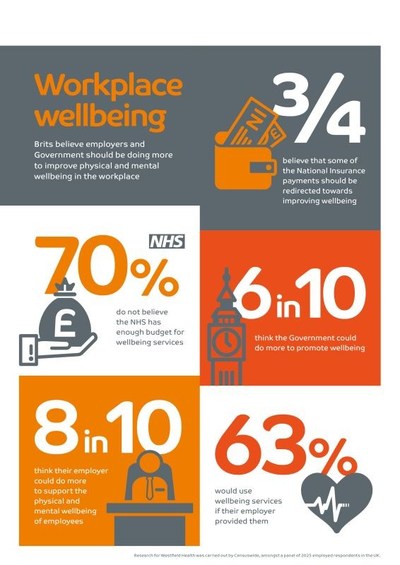Westfield Health Research Asks if National Insurance Contributions are Inadequate to Fund Physical and Mental Health
LONDON, April 17, 2018 /PRNewswire/ --
- 3/4 believe that some of the National Insurance payments should be redirected towards improving wellbeing
- 70% do not believe the NHS has enough budget for wellbeing services
- 6 in 10 think the Government could do more to promote wellbeing
- 8 in 10 think their employer could do more to support the physical and mental wellbeing of employees
With workplace-related stress, illnesses and mental health issues becoming a bigger concern than ever, is it time for employers to be taking the burden from the NHS? More than half of working adults believe that UK businesses are not doing enough to support the physical and mental wellbeing of their employees, according to a new study released today.
(Photo: https://mma.prnewswire.com/media/678019/Workplace_Mental_and_Physical_Health.jpg )
(Photo: https://mma.prnewswire.com/media/678020/Workplace_wellbeing_Infographic.jpg )
The vast majority (86%) believe that firms are specifically not doing enough to help employees deal with work-related stress, anxiety and other mental health issues.
And with seven out of 10 of those surveyed by Westfield Health saying that the NHS does not have the budget to provide wellbeing services, such as health check-ups and cognitive behavioural therapy. Almost three quarters agreed it would be a good idea for a portion of their National Insurance contributions to be redirected towards employee wellbeing programmes. Currently 12% of the average salary (£157-£866 per week) goes towards National Insurance.
Commercial Director of Westfield Health, David Capper, said: "With the financial pressures of a growing and ageing population, alongside rising public expectations of the level of care they receive, the NHS is under greater strain than ever. And, with the cost of presenteeism being so vast for UK businesses, doesn't it make sense for employers to relieve some of the pressure though wellbeing initiatives?"
A government-backed auto-enrolment scheme for wellbeing programmes - funded by employers and by a portion of employees' National Insurance contributions - is just one of the ideas that could form part of a revamped funding plan for the NHS to address its long-term financial needs.
In addition, a recent Deloitte report* found that presenteeism is costing businesses an estimated up to three times more than absenteeism, approximately £16.8bn - £26.4bn per year.
Capper, continued: "As business leaders, we need to create a culture where our people's health and wellbeing is prioritised to drive confidence, capability, inspiration and ultimately prosperity."
Dr Anouska Carter, Principal Researcher at AWRC (Advanced Wellbeing Research Centre) at Sheffield Hallam University, said: "The prevention of chronic disease and maintenance of good health, require complex lifestyle behaviour change interventions that are based on sound scientific principles."
"The right working environment to help employees lead a healthy lifestyle can benefit not only the employees and the businesses that they work for, but will also relieve pressure on the NHS."
For more information about workplace health and wellbeing, please call 03331 227343 or visit http://www.westfieldhealth.com/business .
Notes to Editor
Research conducted by Westfield Health in April 2018, surveying 2,025 UK employees.
*Source - Deloitte UK Mental Health Monitor, October 2017
About Westfield Health
Westfield Health is an award winning not-for-profit health and wellbeing provider, committed to improving people's quality of life by inspiring them to make healthier choices at work and at home.
Find out more at http://www.westfieldhealth.com


Share this article